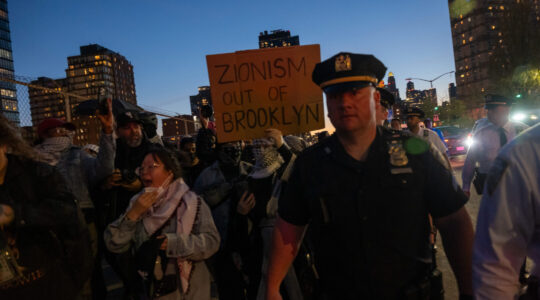Jerusalem — Israeli university officials say the American Studies Association boycott of Israeli academic institutions is unlikely in the short-term to exacerbate the decade-long “soft” boycott already being felt by many Israeli professors. But they fear that larger, more influential groups will decide to join the boycott bandwagon, with possibly devastating results.
While the officials acknowledge that the ASA, with just 5,000 members (only 1,200 voted on the matter), has relatively little clout, they view its boycott in the context of the larger Boycott, Divestment, Sanctions (BDS) movement that likens Israel to apartheid-era South Africa.
Professor Boaz Golany, vice president for external relations and resource development at the Technion Institute of Technology, told The Jewish Week that he anticipates “no immediate impact” from the ASA boycott on the Technion or other Israeli universities. But he said he worries that the BDS movement, emboldened by the ASA vote, will work even harder to “tarnish the image of Israel in general and in particular its academic institutions.”
Golany emphasized that Israel’s universities “don’t view the ACA boycott as a stand-alone event. We view it as part of a concentrated campaign by people trying to delegitimize Israel.”
The administrator ticked off a list of recent boycott attempts by universities in Australia and England, and on several college campuses in California. Though largely unsuccessful, he said, the campaigns helped fuel anti-Israel sentiments.
If the boycotters are ultimately successful, many of the Technion’s 560 tenure-track professors could be affected, Golany acknowledged. “Every one of them has several collaborators, co-authors of scientific papers and research proposals from outside Israel, and many of them are in the U.S.”
A large percentage of Technion students do their doctoral and post-doctoral work in North America, and form lasting professional relationships as a result.
Golany said he and other university officials appreciate “the strong support” for Israel they receive from their American counterparts.
“Many professors from the rank and file have written us e-mails of support. But I am worried that if we don’t stand up and fight against the campaign, it will eventually hurt us.”
The best way to do this, Golany said “is to expand, strengthen and deepen the collaborations with our partners overseas. Our way isn’t to fight or complain or argue with these [pro-boycott] people. Our way is to show the world there is so much to benefit from partnering with Israeli universities. Such collaboration yields synergetic effects that are for the benefit everyone involved and humanity at large.”
To emphasize Israeli universities’ contributions to the world, the U.S.-based “Friends” organizations of Technion, Hebrew University, Tel Aviv University, Haifa University, the Weizmann Institute, Ben-Gurion University and the Open University sponsored a New York Times ad that appeared last Friday.
The ad opens with the words “Boycott a Cure for Cancer? Stop Drip Irrigation in Africa? Prevent Scientific Cooperation Between Nations?” and ends with examples of the scientific contributions Israeli universities have made to the world, including technology being used to clean oil spills and drugs to fight cancer and Alzheimer’s.
The ad congratulates the 40,000 member American Association of University Professors (AAUP), “which has proclaimed that the ASA ‘vote represents a setback for the cause of academic freedom.’”
Like Golany, Gerald Steinberg, a political science professor at Bar-Ilan University, which, after the ad ran in the Times, added its name to the ad for future publication, predicted little practical short-term fallout from the ASA boycott because it is “a marginal organization.”
Steinberg, the founder of NGO Monitor, an organization that tracks human rights-related non-governmental groups, said that “people with an anti-Israel orientation don’t wait for organizations to issue boycotts.”
Almost since the inception of the BDS movement a dozen years ago, and especially since the British academic boycott movement began flexing its muscles in 2002, individual academics in Europe and elsewhere have tried to impose a “soft” or “silent” boycott of Israeli academics, especially those in the natural sciences, Steinberg said.
“It’s harder for Israelis who are not of the ‘proper’ political persuasion to get published in many journals, and there are many examples of Israelis not invited to conferences, or in some cases are uninvited,” Steinberg said. “There’s a sinister process going on and I don’t think the ASA will change that, one way or the other.”
Steinberg would like to see Israeli academics do much more to fight these attempts to marginalize Israel.
“The Israeli academic community has been far too silent and ostrich-like to expect political warfare to disappear,” he said. If it were up to Steinberg, the Israeli government would confront European governments, “and especially the EU,” over the “20 million Euros” these governments give to organizations “that use a disproportionate amount of that money to promote BDS.
“The government should tell these governments that if their funding promotes BDS, that takes Europe out of the peace process,” Steinberg asserted.
Rivka Carmi, president of Ben-Gurion University of the Negev, worries that the ASA vote represents “a tipping point” in favor of the BDS movement. For years “there have been anti-Israel sentiments on campuses abroad. It’s come to the point where you can talk openly about boycotts, and I’m concerned this will turn into something serious.”
Carmi said that “every now and then” her university’s professors, including leaders in their fields, complain they have been excluded from a conference or from contributing to a journal because they are Israeli.
“It’s subtle and not something they can prove, but it’s been happening during the past year or two.”
The BGU administrator fears that the ASA boycott, which in theory targets universities rather than individuals (unless they receive government sponsorship) will encourage or force overseas universities to cancel Israeli study-abroad programs, joint degree programs and funding from abroad.
“I’m very concerned on an institutional level,” Carmi said. “The boycott gives people moral permission to exercise their [anti-Israel] positions.”
Carmi noted that BGU has “close to 1,000” Arab students out of a student population of 18,000, and that last year, 18 Jordanian students completed a three-year degree in emergency medicine. They are now back in Jordan “creating the country’s emergency medicine infrastructure.”
The school also has Palestinian and Jordanian students learning about water and energy use.
“If there is a boycott,” Carmi said, “those will be the first ones to suffer.”
The New York Jewish Week brings you the stories behind the headlines, keeping you connected to Jewish life in New York. Help sustain the reporting you trust by donating today.




